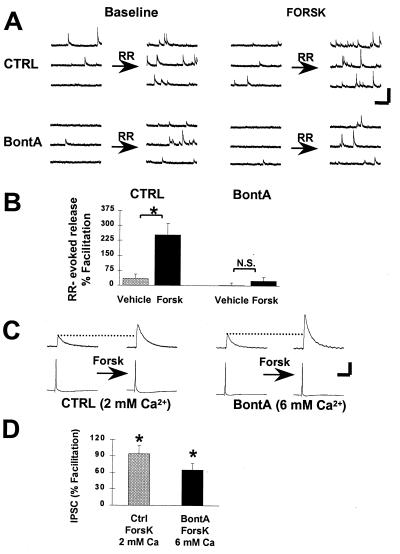Figure 3.
Evidence for PKA-mediated modulation of an early step in the release process. (A) Activation of cAMP production and PKA by forskolin facilitates Ca2+-independent, RR-evoked release in control cultures (Top). This facilitation is expressed as an enhancement of the efficacy of RR to accelerate the frequency of minis in the presence of forskolin (FORSK). In BontA-treated neurons (Bottom), RR still increases the occurrence of minis, but this action of RR is not facilitated by forskolin. (Calibration = 100 pA, 500 ms.) (B) Summary data illustrates that forskolin produced a significant enhancement of RR-evoked release in control preparations (n = 6) (∗, P < 0.01) whereas it was ineffective in BontA-treated cells (n = 7) (N. S., not significant). Exposure of cells to the vehicle solution (dimethyl sulfoxide) failed to change RR-evoked release in both control (n = 4) and BontA-treated (n = 5) preparations (Vehicle). (C) Dual whole-cell recordings were performed to measure facilitation of action potential-evoked IPSCs. In control cell pairs recorded in the presence of 2 mM Ca2+ (Left), IPSCs were facilitated readily by perfusion of 20 μM forskolin (Forsk). In BontA-treated pairs, no IPSCs were detectable at 2 mM Ca2+, but increasing Ca2+ to 6 mM permitted recovery of IPSCs. These rescued synapses were facilitated by forskolin (20 μM) (Right). (Calibration = 60 pA or 45 mV, 50 ms.) (D) Summary data of the synaptic facilitation expressed as a percent increase of IPSC amplitude above baseline. Significant facilitation was detected for both control (n = 9) and BontA-treated (n = 5) synapses (∗, P < 0.05).

